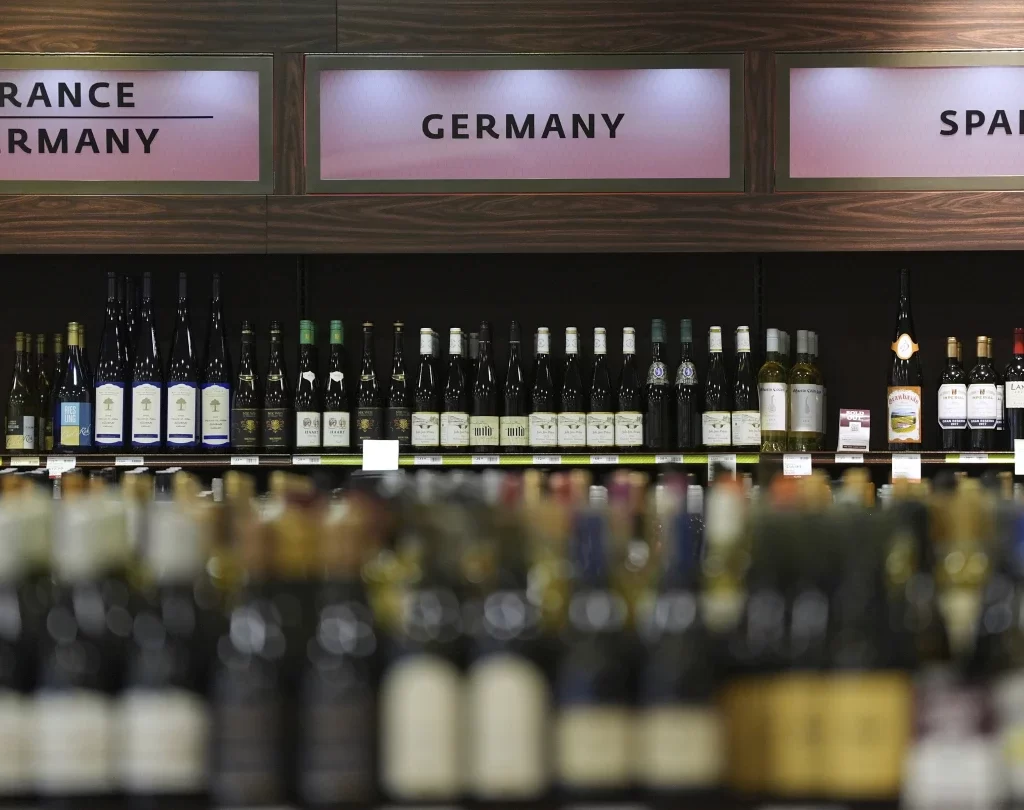Table of Contents
ToggleThe Impact of Potential 200% Tariffs on European Alcohol Imports by the U.S.
All of a sudden, European wines are not as appealing in the United States because of U.S. 200% tariffs.
In response to the European Union’s proposed 50% tax on American whiskey. President Donald Trump warned Thursday to impose a U.S. 200% tariff on European wine, champagne, and spirits. Wine retailers and importers warned a tax that scale would effectively shut down European wine business in United States.
“I don’t think customers are prepared to pay two to three times more for their favorite wine or Champagne,” says Ronnie Sanders, CEO of Vine Street Imports in Mt. Laurel Township, New Jersey.
Jeff Zacharia, president of luxury wine merchant Zachys in Port Chester, New York, says 80% of the wine he sells comes from Europe. Importers rely heavily on European wines for distribution, he added, and there isn’t enough wine in the United States to compensate.
“This is just going to have a major negative impact on the whole U.S. wine industry in all aspects of it, including U.S. wineries,” said the minister.
Zacharia state that there are so many unknowns right now, he has ceased purchasing European wine until the situation is clearer.
“It’s very hard to make preparation when a business don’t have a clear path.
Alcohol taxes are not new, and historical evidence shows their possible effects.
A 25% duty on American whiskey shipment to Europe in 2019 caused a 20% drop in sales in just one year. A similar 25% levy on Scotch whisky imports to the US resulted in a 17% decline in sales.
“This would significantly harm the European export market to the U.S. Which remains one of the most valuable in the world,” she said.
With over a quarter of all product shipments, the United States is the biggest market for European wines and spirits.
The United States imported $5.5 billion worth of alcoholic beverages and $5.6 billion worth of wine from the European Union.
Who Is Most at Risk of Losing?
High-end European producers, especially those dependent on U.S. demand, would be the biggest losers. Scotch whisky, Spanish wines, Italian prosecco, and French champagne are all at risk of experiencing steep drops in sales.
Higher costs would also affect American consumers, particularly those used to high-end European wines and spirits.
But Europe and the UK, two of the largest markets for American whiskey, may counter with their own duties, which could surprise some U.S. whiskey manufacturers.
“The market that is subject to tariff is the largest whiskey market made in the United States,” Lodewijks stated.
Stock Market Reaction
Trump’s announcement sent European alcohol stocks plummeting as investor considered the potential impact of tariffs on key exports.
So Davide Campari-Milano, the Italian company that own Campari, Aperol, and Wild Turkey, saw its shares fall 4.2% as of 3:00 p.m. Central European Time.
Pernod Ricard of France fell 3.9%, trailing only Absolut Vodka, Jameson Irish Whiskey, and Martell Cognac.
Heineken, the Dutch beer behemoth, down 0.6%, and LVMH, the luxury conglomerate that control Hennessy and Moët & Chandon, fell 1.4%.
American distiller got benefit as European equities suffered. Expectatios that Trump’s pressure would result in the lifting of EU tariffs on American whiskey, which would reopen European markets to American manufacturers, caused Brown-Forman, the company that makes Jack Daniel’s, to rise 2.1%.
Industry Reaction: Putting Up Stocks Before the Storm?
So Some industry operators are front-loading inventory, importing goods in large quantities ahead of possible price increases, in response to the impending tariff risk.
According to Lodewijks, “tequila producers are increasing shipments to the U.S. ahead of tariffs.”
However, the US alcohol market is already oversupplied, limiting how much new inventory can be absorbed.
“But Distributors are sitting on unprecedented amounts of inventory. “There’s only so much they can take before logistics and financing become an issue,” Lodewijks explained.
Beyond the immediate impact on pricing and supply chains, the most significant concern remains ambiguity.
“The main issue with this trade war is a lack of clarity. “It changes every day,” Lodewijks explained. This unpredictable nature makes it difficult for firms to prepare, resulting in “paralysis” in decision-making.



